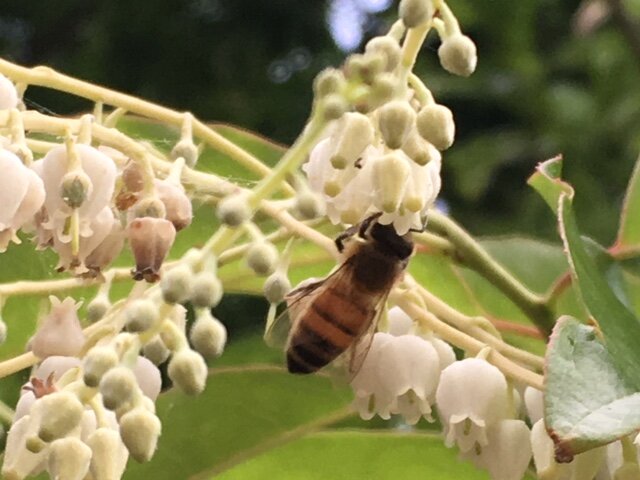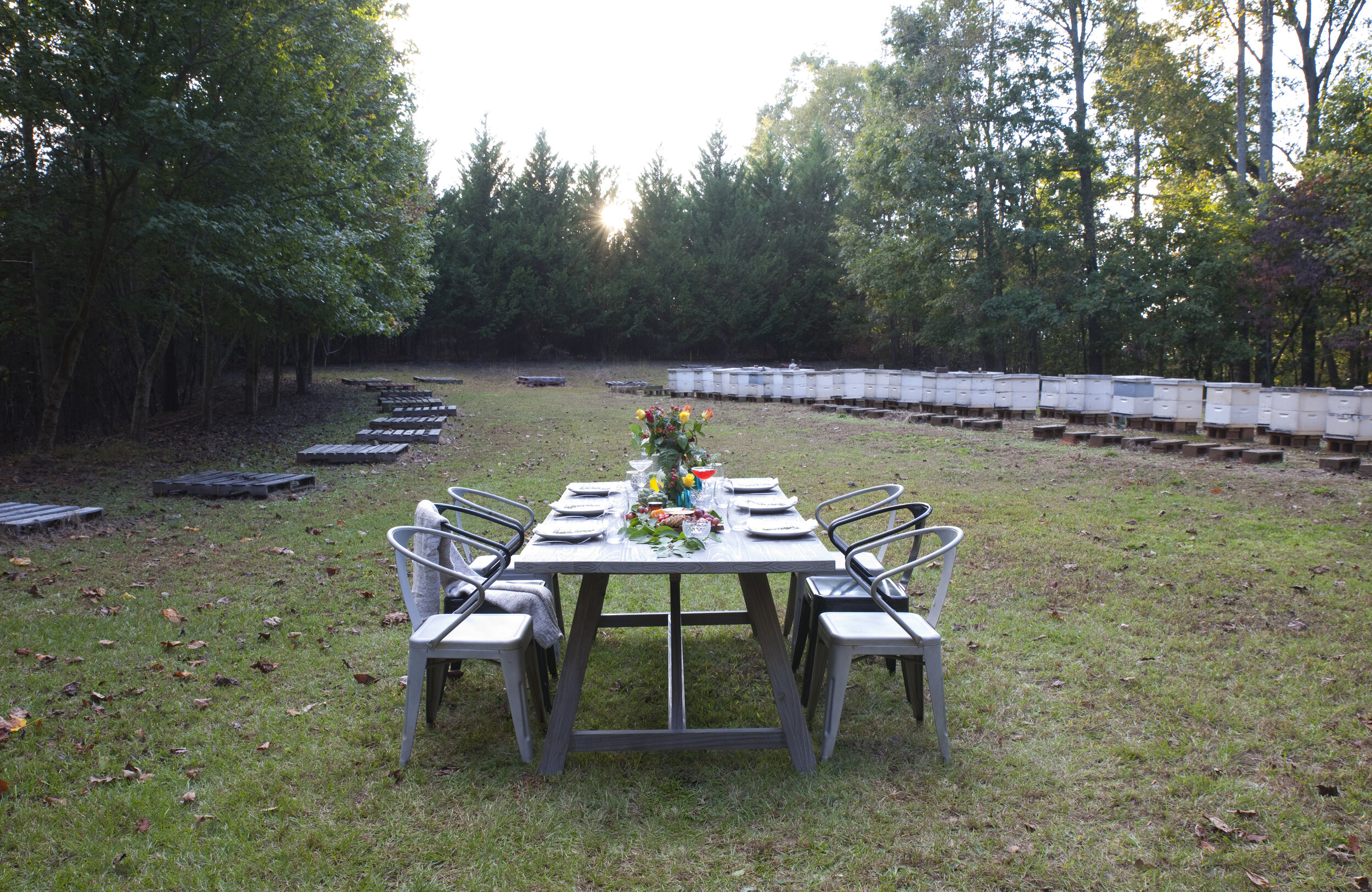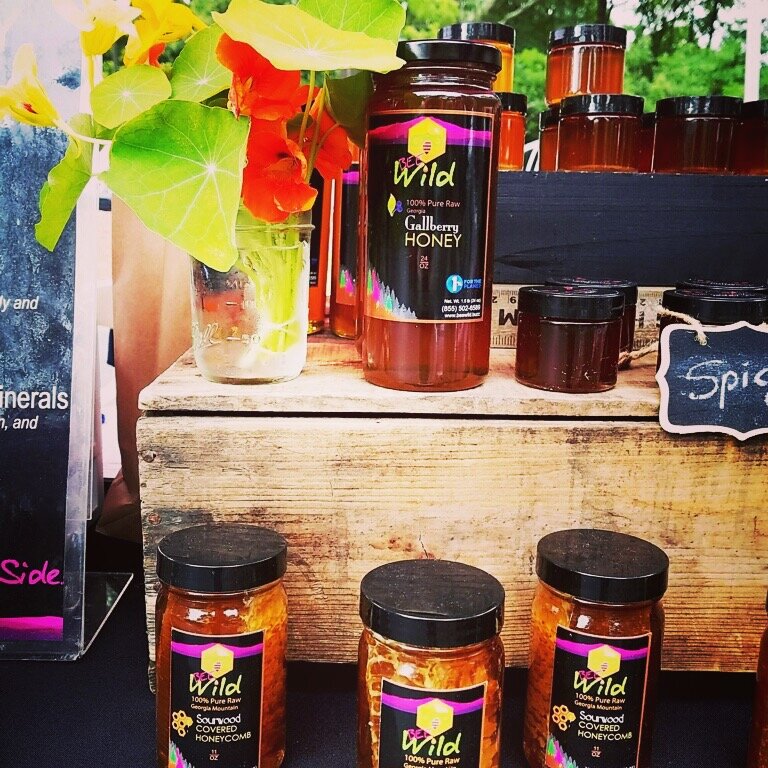‘Bee’ Authentic: This Georgia beekeeper took a family business and made it his own
By Nicole Newman // Photos courtesy of John Wright
“I decided to start a brand and was big on conveying to our customers what it truly is that they are purchasing. The uses for it, the medicinal properties, etc. That was the turning point: realizing I’m sitting on a gold mine of knowledge and value that’s waiting to be tapped.”
When children grow up surrounded by something special, it’s common for them to take it for granted. Because that particular thing is around so often, the children do not realize how rare, beautiful and unique that thing may be. This is exactly what happened to John Wright, owner of Bee Wild. From a young age, Wright was indoctrinated with a love for honeybees. His father was a beekeeper, working long hours to produce a deliciously sweet commodity. When it was time for Wright to enter the workforce, he initially thought that maybe the family business was not for him.
After nearly a decade in the salon industry, Wright had a revelation: he did not need to do things the same way his dad did. He set out to educate buyers of the extraordinary nature of honey, ensuring everyone who comes across his honey appreciates its true value. Nicole Newman chatted with Wright about his history, his passion, his devotion to authenticity and his extraordinary products.
Nicole Newman: How did you first discover your passion for making honey? From what I’ve read, you started out at the young age of 10, correct? Tell me more about growing up with bees.
John Wright: I grew up not really understanding the value or importance of bees. It was just the family business. It wasn’t until 2011 when I started Bee Wild that the light bulb went off. I realized that my dad wasn’t really telling the story behind it and wasn’t really valuing it enough for how truly special it is. To have something that is made from the bees that varies from season to season, it varies like fine wine. He was treating it like ketchup or mustard, like a condiment. And that’s how our customers think of it. They love it, but they don’t understand why they love it. I decided to start a brand and was big on conveying to our customers what it truly is that they are purchasing. The uses for it, the medicinal properties, etc. That was the turning point: realizing I’m sitting on a gold mine of knowledge and value that’s waiting to be tapped.
NN: Beekeeping has been in your family three generations. Is this something you always wanted to do?
JW: No, it’s actually quite the opposite. Because my dad didn’t value it in the way that I valued it and he never taught me the importance of bees in the ecosystem. Beekeeping is very autonomous; it’s his thing and he loves the autonomy. With beekeeping, you don’t have to have help, you can do it yourself. You don’t need a big team and doesn’t need to be complicated. I grew up thinking this looked like slave labor. It’s a bunch of work and there’s nothing special about it. It’s not worth the work that goes into it. But when I had my light bulb moment, I realized that I don’t have do everything myself. I don’t have to be the CEO, the janitor, the accountant. I can hire other roles. This was a big revelation back in 2011.
NN: At what point did you decide to launch a honey-making business?
JW: I was working at a salon in Atlanta full time. I’d been in the salon industry since I was 16 and I was about 24. But looking around, [it] didn’t feel like me. I realized there had to be something more. This was too limiting.
So I changed courses. When this light bulb turned on, I thought that it was great because I could immediately see myself [beekeeping]. This was something I could stand behind because it was a multi-generational family business. In the past, I had tried selling other company’s products. I struggled so much because I was selling someone else’s stuff, and it wasn’t mine. I realized that this was mine. I was selling a part of a me, and that is what was missing before. This is my product, I created this brand, I grew up on this farm. And people responded totally different. Even before I got into farmer’s markets, it was effortless. People knew that that’s what our family does and when I told them I had my own brand now, they wanted to try it. It was empowering.
NN: The name Bee Wild is more than just a play on words… can you tell me why you chose that specific name for the business?
JW: I was going for a brand essence that matched what I was already feeling. The brand I was imagining was very nature-y, earthy, but also colorful, vibrant and expressive. One of our core brand traits is authenticity. It is something we talk about a lot and it relates to the brand itself and what we do. It really is very much present; it doesn’t get much more authentic than what the bees have created that particular year. The way we do our honey is the authentic product, pure, raw… We want customers to experience it this way and not like the big honey operations where everything is mixed together. We are bringing you honey straight from the hive.
NN: Tell me about your old-school beekeeping practices.
JW: We don’t move our hives around to different locations and we don’t take our bees to pollinate almond orchards or citrus orchards. We leave our bees stationary, in one spot. And because of environmental factors like rainfall, for example, the honey is still so different year to year. You get different ratios of nectar, which is how you make the honey. We don’t move the bees; they’re in the wild. That’s another reason we went with ‘Bee Wild.’
I realized we are producing something that is equivalent to fine wine. When you come to our booth, you experience a honey tasting just like you would a wine tasting. We explain the flavor profile to you and the honey pairings. If we took our bees around to different farms, we’d have little to no variation and it would be the same all the time.
NN: Tell me about the first type of honey you ever decided to sell.
JW: What we are most known for is our sourwood. The bees go to a sourwood tree and collect the nectar, and that’s how they make the honey. That’s our most popular. We actually won a national food award in 2017 for the sourwood honey. My great, great grandfather who started this over 80 years ago, was also most known for sourwood honey. That’s what his bees produced.
NN: I’d love to know more about some of the flavors you offer in Makers Marketplace. Do you have a favorite?
JW: Our Devil’s Advocate — the spicy one — is very popular. … It lends itself to a great marinade for meats. It’s great for grilling chicken, salmon, pork, shrimp. (Get Cat Neville’s recipe for honey-brined pork with Bee Wild Devil’s Advocate hot honey vinaigrette here!) And it’s very versatile; it’s not too hot even though it’s made with peppers. It’s a mild heat and it’s a great gift for a guy. It’s a novelty product but there’s also a very high application for it.
My favorite is the lavender-infused honey. It’s absolutely exquisite. Our infused honeys are really fun. We’ve gotten such good feedback on the infusions. It’s similar to the sourwood in the sense that it’s smooth and buttery and has a nice caramel finish. You could eat it plain. The lavender is so smooth, but there’s none of the woody notes you would get. We infuse the honey with the lavender buds only. We only use the flower and seed of the lavender plant and we don’t get the stems and leaves in there. It’s much lighter and not overpowering, but the lavender is very much still present. It goes great on breads, cheeses, in tea.
NN: Tell me about your membership in 1% for the Planet.
JW: We got on board with them about five or six years ago. As soon as we got to the point that we realized we were self-sustaining and viable as a small business, I realized we had to start doing something to give back. But, we couldn’t afford to give a lot. So when I found out about 1% for the Planet and that it was only one percent of your total annual revenue, I thought that would be perfect. I knew those numbers could work. When I started looking into it, I saw it was a large organization that was connected to many small businesses and non-profits. It was a community that I wanted to be plugged-in with.
Then, when I started reading about the program, I realized that we pay a membership fee and our one percent donation goes to a non-profit of our choice. So we have the freedom to choose that every year. We went through all the non-profits registered with 1% for the Planet and found the one that aligns with our mission the most, which obviously was to protect, save and advocate for the honeybees. We found The Center for Food Safety and we started researching them. They are doing a lot of things to protect honeybees. A lot of it has to do with getting laws passed to ban agrochemicals that are toxic to the bees. All of our money goes to them; 1% for the Planet doesn’t take anything at all.
NN: Why is the maker movement important to you?
JW: I really feel that we need to go back to small-batch, ethically produced, hand made products. The goal most of the time when something's made in mass quantity is “how cheap we can make this?” With a maker, the goal is completely the opposite. It’s how much value you can bring to the audience so you can grow sustainably. It’s a lot more fulfilling. It’s a win-win: it’s benefitting the makers and the people who are buying their products.




